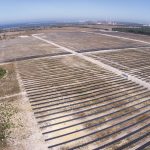Centeno says Portuguese banking sector must stash the cash for a rainy day
Text and Photo: Chris Graeme
The Governor of the Bank of Portugal, Mário Centeno, has called for prudence when managing a “unique phase” in Portugal’s banking sector.
Portugal’s banks enjoyed a bumper year in the first half of the year, raking in a record €4.2Bn in H1 of 2023, while this week Portugal’s main five banks said they would pay out dividends to shareholders, despite warnings from the IMF not to splurge the cash, and should rather ensure they have a comfortable buffer to cope with any future crisis.
Nevertheless, Portugal’s banks say they are sitting pretty with decent levels of capitalisation and increased margins, and so can afford to pay out dividends to their shareholders.
To September 2023, Santander made a net profit of €390 million in Q3 and €622 million to September, BCP made €650.7 million, while Novobanco made a record profit of €640 million to September. All told the Portuguese banking sector is on target to rake in profits well in excess of last year’s €2Bn record for recent years, or 8.5 million in profits per day!
Moreover, recording times when the banks made hay while the sun shined in the run-up to Portugal’s 2011-2014 banking crisis, which when it came caused serious problems because the banks had been profligate in their lending, over-leveraging on big ticket loans, particularly in the resorts tourism sector, Portugal’s central bank governor said they hadn’t been prepared with a buffer for the tough times.
The economist, who until yesterday was tipped as the man chosen by Prime Minister António Costa to lead a caretaker government following the President of the Republic’s decision to dissolve parliament, and call a general election for March, said that Portugal’s banking sector was enjoying good results after a “very, very difficult period for the sector and for all of us”.
The former Eurogroup president (2018-2020), member of ECOFIN, and Portuguese Finance minister (2015-2020) said that the banks needed to be careful in how they managed their profits, and recalled that they had a poor record for putting money away for a rainy day when it came to being prepared for unexpected financial crises like the one that hit the banking sector between 2011 and 2014.
Addressing members of the American Club of Lisbon who lunched on the stage of the Tivoli BBVA Theatre in Lisbon on Thursday, Mário Centeno said that regulating and supervising the banking sector was one of the main tasks not just of the Bank of Portugal, but also the Minister of Finances.
Speaking to the President of the ACL, Patrick Siegler-Lathrop (pictured left) who moderated the event with the Chairman of BBVA – Luis Castro Almeida (Pictured right), Centeno said: “The most important thing now is that the banking sector understands that this is the time to build up its buffers and create buffers which are necessary because the (economic) cycle can change again and will change. We don’t know when, but we have to be prepared.”
Centeno said that the Bank of Portugal had a responsibility to ensure financial stability, but also reminded that it was also a task shared with the minister of Finances.
Despite this “unique phase” that Portugal is enjoying, “Portugal’s big error historically is that it has never been prepared for the next crisis”.
It was a trend that he believed he had managed to reverse during his time in government when in 2019 Portugal achieved its first budget surplus.
Mário Centeno stressed his role in financially providing leverage for families and companies after some State leverage” he said, referring to the periods of grace to companies and families on bank loans negotiated with the banking sector during the Covid-19 pandemic, and the financial assistance packages provided by the Government and masterminded by the Bank of Portugal, the Ministry of Finances and Portugal’s new development bank, Banco do Fomento, which paid out the credit lifelines to businesses.
“The country was prepared to face a difficulty, and we faced the biggest challenge we had faced in some decades”, he said referring to the Covid-19 crisis, adding “we got through it very well.”
“I am very happy and proud with the contributions made by the Portuguese government and the Bank of Portugal since financial stability is a two-way street,” he said, adding that politicians tended to see differences where there weren’t”.
“Politicians try too hard to amplify reality to place themselves in a unique position, when in fact the differences in policy lines and those of EU countries are less than they would have you believe”, said Centeno.
“When the snapshot is printed in regular sizes, you don’t notice much difference. But they (the politicians) are always blowing things up and seeing huge differences. This is especially true in Europe. In Europe we spend a lot of time arguing about supposed differences between countries and differences in policy lines when they hardly exist”.
“Long discussions don’t perhaps convince them, but numbers don’t lie, and I don’t think these differences are true most of the time,” said the Governor of the Bank of Portugal, Mário Centeno.










